Introduction:
As an aquarium owner, it is crucial to provide a stress-free environment for your fish, especially during tank maintenance. Stress can weaken their immune system and make them more susceptible to diseases. In this article, we will discuss some expert tips to help you maintain a stress-free environment for your finned friends during tank maintenance.
I. Understanding the Importance of a Stress-Free Environment
– The impact of stress on fish health
– How stress affects the immune system
– Why maintaining a stress-free environment is vital during tank maintenance
Fish, like any other living organisms, can experience stress. Stress can be caused by various factors such as sudden changes in water parameters, noise, disturbances, and handling. When fish are stressed, their immune system weakens, making them more vulnerable to bacterial, fungal, and parasitic infections. Therefore, it is crucial to maintain a stress-free environment to ensure the overall health and well-being of your fish, especially during tank maintenance.
II. Planning Ahead for Stress-Free Tank Maintenance
– Scheduling regular maintenance sessions
– Gathering all necessary equipment before starting
– Creating a checklist to ensure a smooth process
Planning ahead is essential to minimize stress during tank maintenance. By scheduling regular maintenance sessions, you can establish a routine that your fish will become accustomed to, reducing their stress levels. Before starting the maintenance, make sure to gather all the necessary equipment such as nets, siphons, scrubbers, and water test kits. Creating a checklist can help you stay organized and ensure that you have everything you need for a stress-free maintenance process.
III. Minimizing Noise and Disturbances
– Choosing the right time for tank maintenance
– Reducing external noise sources
– Avoiding sudden movements and loud sounds near the tank
Choosing the right time for tank maintenance is crucial to minimize stress. Avoid performing maintenance during feeding times or when there are other disturbances in the environment. Reduce external noise sources such as loud music or television near the tank. Additionally, avoid sudden movements and loud sounds near the tank as they can startle the fish and increase their stress levels.
IV. Maintaining Consistent Water Parameters
– Monitoring and adjusting water temperature
– Regularly testing and maintaining proper pH levels
– Ensuring appropriate levels of ammonia, nitrite, and nitrate
Consistent water parameters are essential for the well-being of your fish. Fluctuations in temperature, pH levels, and ammonia, nitrite, and nitrate levels can cause stress and harm to your fish. Monitor and adjust the water temperature to ensure it remains stable. Regularly test and maintain proper pH levels to create a stable environment for your fish. Additionally, ensure appropriate levels of ammonia, nitrite, and nitrate by conducting regular water tests and performing necessary water changes.
V. Handling Fish with Care
– Using a soft net for transferring fish
– Avoiding excessive handling or chasing
– Minimizing stress during catching and releasing
When handling your fish during tank maintenance, it is essential to do so with care. Use a soft net to transfer fish from one container to another. Avoid excessive handling or chasing of fish as it can cause unnecessary stress. Minimize stress during catching and releasing by doing so gently and swiftly.
VI. Proper Acclimation Techniques
– Gradual temperature adjustment when introducing new water
– Slowly acclimating fish to new water parameters
– Using stress-reducing additives or conditioners
When introducing new water during tank maintenance, it is crucial to use proper acclimation techniques. Gradually adjust the temperature of the new water to match the existing tank water. Slowly acclimate fish to new water parameters by adding small amounts of the new water over a period of time. Additionally, using stress-reducing additives or conditioners can help minimize stress during tank maintenance.
VII. Maintaining Good Water Quality
– Regularly cleaning filters and removing debris
– Conducting partial water changes to prevent ammonia buildup
– Ensuring proper oxygenation levels
Maintaining good water quality is essential for minimizing stress in your fish. Regularly clean filters and remove debris to prevent the accumulation of harmful substances. Conduct partial water changes regularly to prevent ammonia buildup and ensure a healthy environment for your fish. Additionally, ensure proper oxygenation levels by providing adequate aeration and circulation in the tank.
VIII. Avoiding Overstocking and Aggressive Tankmates
– Understanding the importance of appropriate tank size
– Researching fish compatibility and behavior
– Providing sufficient hiding places and territories
Overstocking and aggressive tankmates can cause stress and harm to your fish. Understanding the importance of appropriate tank size is crucial to provide enough swimming space for your fish. Research fish compatibility and behavior to ensure peaceful coexistence in the tank. Provide sufficient hiding places and territories to reduce conflicts and stress among tankmates.
IX. FAQs (Frequently Asked Questions)
– How often should I perform tank maintenance?
– Can stress during tank maintenance lead to diseases?
– Is it necessary to remove all fish from the tank during maintenance?
– Are there any stress-reducing medications for fish?
To address common queries, we’ve included a FAQ section in this article. Questions such as how often to perform tank maintenance, the impact of stress on fish health, the need to remove fish during maintenance, and the availability of stress-reducing medications for fish will be answered to provide a comprehensive guide for aquarium owners.
Conclusion:
Maintaining a stress-free environment during tank maintenance is essential for the overall health and well-being of your fish. By following the expert tips discussed in this article, you can minimize stress levels and create a serene environment for your aquatic companions. Remember, a stress-free fish is a happy and healthy fish!









